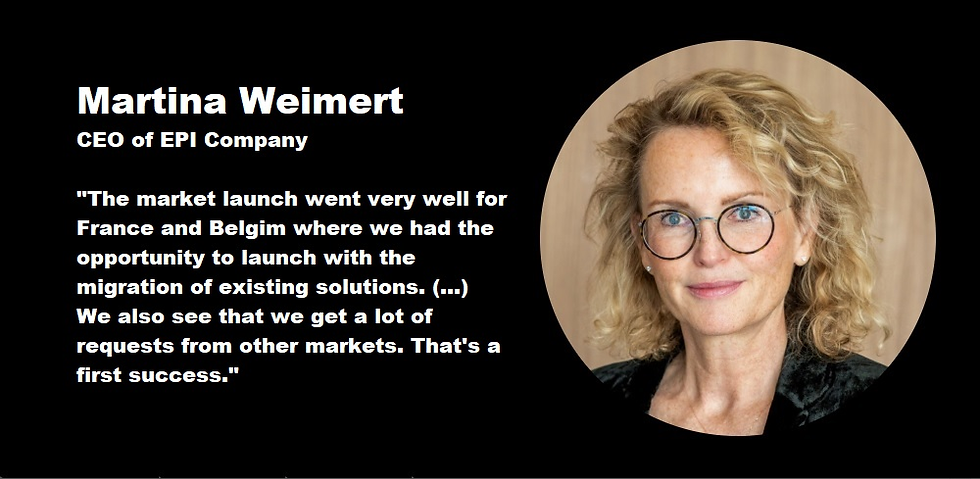Wero Expands in Belgium: A Deeper Integration into Europe’s Strategic Payment Infrastructure
- Marketing Team Compaytence
- Jul 14, 2025
- 5 min read

Compaytence: Global Payments Brief
In a calculated expansion of Europe’s sovereign financial architecture, five Belgian banks — Argenta, Bank Van Breda, Beobank, Crelan, and vdk bank — have joined the European Payments Initiative (EPI) to support the ongoing rollout of Wero, the EU’s digital wallet and instant account-to-account (A2A) payment solution. This change reflects a wider European intention to reshape its payment infrastructure through collective design, institutional backing, and political alignment.

The European Payments Initiative is a grander attempt to serve the economic sovereignty of the EU. Originally launched as a response to the overwhelming dominance of non-European players in the payments ecosystem, EPI is now executing at scale. Wero, its flagship product, has already gained more than 40 million users across France, Germany, and Belgium. The platform will expand to support e-commerce payments in late 2025, followed by in-store payments, subscription handling, and loyalty program integrations by 2026.
Belgium’s Role: Infrastructure, Influence, and Interoperability
Belgium’s central role in this expansion is both symbolic and strategic. As the seat of European political power and the former hub of Payconiq, Belgium offers a sophisticated ecosystem for digital payment experimentation, adoption, and cross-border alignment. The 2023 acquisition of Payconiq International and Currence iDEAL gave EPI a ready-made technical backbone and market access, streamlining Wero’s integration and growth.

The new members reinforce this foundation with strong retail and SME client bases. And crucially, Bancontact Payconiq Company will act as a distribution partner, giving merchants a seamless path to accepting Wero payments — without overhauling existing infrastructure.
“This collaboration reflects the ambition of both companies and our shareholding banks to continue the success story of mobile payments in Belgium and to ensure continuity for our merchants and app users,”said Nathalie Vandepeute, CEO, Bancontact Payconiq Company.
The partnership ensures that merchants — often the overlooked but decisive link in any payments transition — can onboard without disruption. Consumers will retain their preferred experience while the backend architecture transforms.
Functional Scope: A Multi-Layered Payment Platform
The Wero platform goes far beyond basic money transfers. Its planned feature set includes:
Instant A2A payments (P2P and P2Pro)
E-commerce transactions
Recurring subscriptions (e.g. Spotify, Streamz)
Instalment payments (3/5/10x)
Event-based triggers (pay on delivery)
Usage-based flows (e.g. vehicle charging pre-authorisations)
Loyalty and rewards integration
Deposit handling for rentals and bookings
Cross-border payments within the EU
Each new feature is strategically designed to displace a component of the card network or wallet economy. And crucially, it will all be delivered through native banking apps and, in some cases, a dedicated Wero mobile app — offering banks a way to retain interface control while participating in a larger system.
“Wero aligns perfectly with our commitment to provide innovative, secure, and convenient payment experiences that meet our customers’ everyday needs,”noted Koen Spinoy, Member of the Executive Committee, Beobank.
“By integrating Wero, we will empower our clients — entrepreneurs and liberal professions — with a fast, secure, and intuitive way to manage their payments,”added Dirk Wouters, CEO, Bank Van Breda.
“The Wero wallet offers our customers payment convenience, security and control,”said Jo Baetens, Director of Payments and Investments at Crelan.
Revolut’s Integration: A Fintech Embraces Institutional Infrastructure
Wero’s credibility as an open, pan-European solution received a notable boost with its integration into Revolut — Europe’s most visible and widely adopted neobank. The move marks a rare intersection between an agile fintech player and an initiative grounded in public-private institutional collaboration.
“Facilitating seamless access to free and instant payments is no longer a nice to have, it’s a must,”said David Tirado, VP of Global Business at Revolut.“By enabling Wero within the Revolut app… we’re empowering our customers to make instant and secure payments seamlessly within European borders.”
Revolut’s backing signals confidence that Wero can function alongside — and eventually compete with — more established global platforms, including Apple Pay and PayPal. This hybrid acceptance from both legacy banks and next-gen fintechs marks Wero as a platform with unusually broad institutional trust.
EPI’s Origins and Direction: From Concept to Continental Network
EPI emerged in the early 2020s as a coalition of Europe’s largest financial institutions — BNP Paribas, ING, Deutsche Bank, Santander, and others — with a shared goal: establish European self-reliance in payment infrastructure. Initially envisioned as a card scheme replacement, EPI has since evolved into a full-spectrum digital wallet and account-to-account platform leveraging SEPA instant rails.
After its pivot and acquisition of Payconiq infrastructure in 2023, Wero began deploying in earnest in mid-2024. Today, it is embedded in the banking apps of nearly a dozen institutions across three countries, with additional rollouts planned in the Netherlands and Luxembourg — two of Europe’s most digitised retail banking markets.
“Thanks to this collective mobilisation, we have the capacity to invest, to digitise and continue to innovate our services, and thus become more competitive on a global scale,”said Michael Anseeuw, CEO, BNP Paribas Fortis.
“With our members’ local presence and close relationship with their customers, Wero will become a trusted part of everyday payments across the continent,”said Martina Weimert, CEO, EPI.

Strategic Implications: Payments as Political Infrastructure
Within the EU’s internal policy debates, digital payments now sit adjacent to cybersecurity, AI regulation, and energy independence. Financial messaging systems, wallet providers, and payments rails are treated as essential infrastructure — and increasingly, as extensions of digital sovereignty.
As policymakers in Brussels push for resilience in the face of geopolitical fragmentation, initiatives like EPI reflect a deeper intent: to avoid strategic dependence on U.S.-based intermediaries while fostering a coherent, scalable European alternative. This is not merely economic policy — it is digital diplomacy, executed at the infrastructural level.
“Customers expect to see a payment on their account immediately. Wero is the solution that meets this expectation,”said Ivo De Meersman, General Manager, KBC.“On top of that, Wero will soon also allow online payments, which is definitely a strong asset for a European payment method.”
The Compaytence Perspective:
Wero’s expansion in Belgium illustrates a broader effort to reshape how digital payments function within the European single market. The project connects incumbent banks, emerging fintechs, and regional infrastructure under a shared objective: to standardize fast, direct, and compliant money movement across borders — without defaulting to non-European platforms or intermediaries.
As Wero moves beyond early adoption, its trajectory will depend on whether it can achieve meaningful uptake across merchant networks and end users. Success will rest less on its technical promise and more on sustained institutional cooperation, regulatory harmonisation, and public trust.
For policymakers, payments are no longer treated as peripheral plumbing. They are increasingly viewed as levers of digital autonomy and economic resilience. Wero is a response to that shift — a system conceived within the EU framework, shaped by its institutions, and deployed through its banks.




Comments